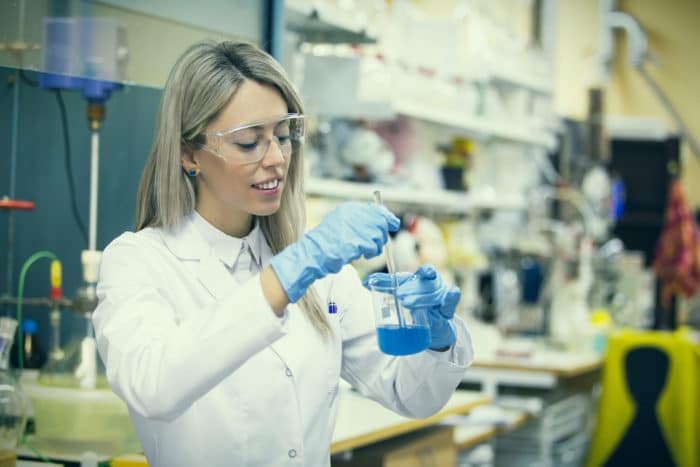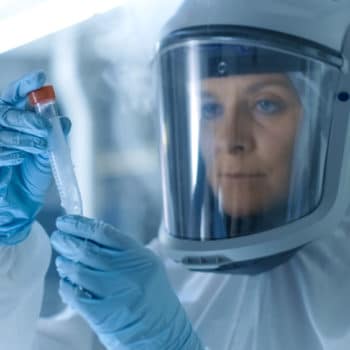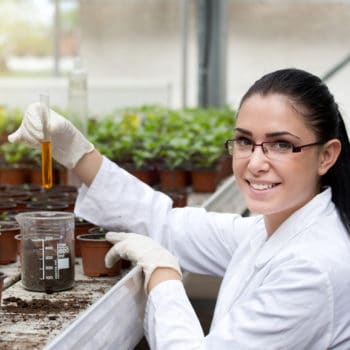Why We Love It
-
$48,730Potential Avg. Salary
-
1.8%Job Growth Rate
-
Growing DemandJob Outlook
-
Dependable Daily WorkloadCareer Attribute
Chemical laboratory analysts assist chemists, biochemists, and chemical engineers with conducting experiments, performing research, and producing chemical compounds. These activities can lead to a variety of outcomes: they may cure disease, enhance crop production, or create new products.
Recommended Schools
What is a Chemical Laboratory Analyst?
The following job responsibilities are common for individuals in chemical laboratory analyst roles:
- Assist chemists, biochemists, and chemical engineers with tasks related to experimentation, research, and production
- Prepare solutions and lab equipment to be used in research, experimentation, or production procedures
- Perform thorough testing of produced chemical compounds to ensure effectiveness and safety
- Clean lab equipment and areas after work is complete
- Prepare summaries of findings to be used by chemists, biochemists, and chemical engineers
A Day in the Life
Chemical laboratory analysts work alongside chemists, biochemists, and chemical engineers. They assist with all procedures related to experimentation, research, and production of chemical compounds. Chemical laboratory analysts and the chemists they work for are responsible for establishing knowledge of how chemicals can be used and combined to extend life or simplify/improve products. They may work to find new treatments for diseases, create compounds that promote crop growth, or create new fibers that can be used in clothing production.
While chemists, biochemists, and chemical engineers are the head researchers for these types of experiments, chemical laboratory analysts play an important role by assisting with research activities. They set up all lab equipment and solutions before research, experimentation, or production begins and ensure all necessary equipment and materials are available. They also clean up labs and equipment after experiments, restock materials, and work to ensure that materials are safely and securely stored.
Chemical laboratory analysts also work to test produced chemical compounds and record results. They compile the results of research and experiments and provide their summaries to the scientists to distribute findings to interested parties. They also conduct thorough testing of produced compounds and materials to ensure that produced compounds are effective and safe for use. Finally, they may also be in charge of troubleshooting malfunctioning research equipment and resolving issues before testing.
Typical Work Schedule
In general, chemical laboratory analysts work full-time during normal business hours. Overtime or evening work may occasionally be required to meet deadlines or assist with time-sensitive experiments.
Typical Employers
Chemical laboratory analysts commonly work in testing laboratories, research and development companies, college research and development departments, pharmaceutical laboratories, and manufacturing laboratories.
Recommended Schools
How To Become a Chemical Laboratory Analyst
The minimum requirement for finding work as a chemical laboratory analysts is an associate’s degree in a field like applied science or chemical technology. These programs are commonly available through community colleges and universities, and teach aspiring chemical laboratory analysts the basics of lab equipment, research best practices, and chemical processes. Students take courses in chemistry and math that prepare them to find work as chemical laboratory analysts after graduation.
While studying for your associate’s degree, it’s important to get real-world experience working in a laboratory. You may be able to earn this experience assisting with experiments in the research laboratory of your college, or you may want to look into internship programs that provide laboratory experience. When seeking employment after graduation, employers will look for candidates with both theoretical and practical knowledge, so earning lab experience is crucial to your success in the field.
With a relevant associate’s degree, you should be able to find work as a chemical laboratory analyst in a laboratory. On-the-job training is usually provided for entry-level positions, and with experience, you may be able to more into high-level roles. However, to perform actual research, you’ll need to continue your education to earn a bachelor’s degree, master’s degree, and possibly even a Ph.D. These higher-level degrees are required to take on roles as chemists, biochemists, and chemical engineers.
Chemical Laboratory Analyst Salary Data
We’ve provided you the following to learn more about this career. The salary and growth data on this page comes from recently published Bureau of Labor Statistics data while the recommendations and editorial content are based on our research.
National Anual Salary
Low Range
$34,240Average
$48,730High Range
$75,230National Hourly Wage
Low Range
$16/hrAverage
$23/hrHigh Range
$36/hrHow do Chemical Laboratory Analyst salaries stack up to other jobs across the country? Based on the latest jobs data nationwide, Chemical Laboratory Analyst's can make an average annual salary of $48,730, or $23 per hour. This makes it an Above Average Salary. On the lower end, they can make $34,240 or $16 per hour, perhaps when just starting out or based on the state you live in.
Salary Rankings And Facts
#407 Nationally for All Careers
Programs and Degrees
Here are the most common degrees for becoming a Chemical Laboratory Analyst. a is usually recommended and specifically a degree or coursework that prepares you for the particular field, see below.
Highest Education Among Chemical Laboratory Analysts
- 3.3% Doctorate
- 6.8% Masters
- 27.5% Bachelors
- 12.1% Associates
- 23.7% College
- 22.7% High School
- 3.9% Less than High School
Job Growth Projections and Forecast
2014 Total Jobs
66,5002024 Est. Jobs
67,700Job Growth Rate
1.8%Est. New Jobs
1,200How does Chemical Laboratory Analyst job growth stack up to other jobs across the country? By 2024, there will be a change of 1,200 jobs for a total of 67,700 people employed in the career nationwide. This is a 1.8% change in growth over the next ten years, giving the career a growth rate nationwide of Below Average.
Growth Rankings And Facts
#557 Nationally for All Careers
What Companies Employ The Most Chemical Laboratory Analysts
| Industry | Current Jobs | New Jobs Needed | % Increase |
|---|---|---|---|
| Testing laboratories | 13,800 | 1,000 | 1% |
| Research and development in the physical, engineering, and life sciences | 6,900 | 1,300 | 1% |
| Pharmaceutical and medicine manufacturing | 5,700 | -600 | -1% |













